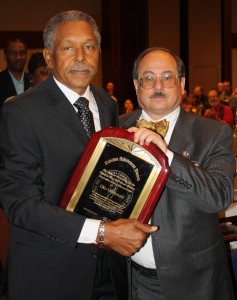
Otis McDonald (left) accepted an award from SAF’s Alan Gottlieb during the Gun Rights Policy Conference in Chicago three years ago.
Second Amendment icon Otis McDonald, who fought Chicago’s handgun ban all the way to the U.S. Supreme Court, died Friday following a long illness. He was 80.
According to his nephew, Dr. Frederick Jones, Mr. McDonald passed peacefully in hospice with family members at his side.
Mr. McDonald’s name will remain synonymous with Second Amendment activism for his 2010 victory over Chicago’s handgun ban in a case brought by the Second Amendment Foundation. Mr. McDonald, who was 76 at the time the U.S. Supreme Court ruled in McDonald v. City of Chicago that its handgun ban violated the Second Amendment, and that the right to keep and bear arms was incorporated to the states via the 14th Amendment. There were three other plaintiffs in the case, which was named for Mr. McDonald as lead plaintiff.
SAF filed the lawsuit originally in June 2008, immediately after the high court had issued its landmark ruling in the Heller case that recognized the Second Amendment as protective of an individual civil right. It took two years for the case to wind its way through the federal court system, with attorney Alan Gura, who argued the Heller case, and Chicago-area attorney David Sigale representing SAF, Mr. McDonald and the other plaintiffs.
Born in Fort Necessity, La., Mr. McDonald moved north to Chicago after serving in the U.S. Army. Dr. Jones told TGM that Mr. McDonald arrived in the Windy City with $7 in his pocket that he had been given by his mother, and for a time he stayed with a friend while searching for and finally landing a job.
Mr. McDonald worked in several jobs before finding a career at the University of Chicago, where he worked as a journeyman engineer. He worked his way through college, earning a degree in engineering from Kennedy-King College in Chicago and later served as president of his local trade union, Dr. Jones recalled.
But in the gun rights community, Mr. McDonald will always be remembered for his role in the Chicago lawsuit. He wanted a handgun for home protection in that city, but the ban on new licensing that was instituted in the early 1980s prevented that. So, supported by SAF and with representation from Gura and Sigale, Mr. McDonald took his battle against the city’s onerous gun law to federal court, bolstered by the Heller ruling that struck down the handgun ban in the District of Columbia as unconstitutional under the Second Amendment.
That victory was a huge blow to the gun control lobby, which had long held that the Second Amendment only protected some collective right of states to form militias.
According to Dr. Jones and author Sue Bowron – they wrote a book telling McDonald’s story as “Act of Bravery: Otis W. McDonald and the Second Amendment” – Mr. McDonald is survived by his wife, Laura and their children, Chandra and Sheila, both of Chicago, and two other daughters, Jessie Marie and Dorsey, and several grandchildren. He was preceded in death by a son, Kelvin.
“Otis truly loved people,” Mr. Gura recalled. “He was universally kind, patient, and positive, and wanted very much to see his neighbors enjoying their freedom to which they are entitled. We all owe Otis a debt of gratitude that he could fulfill that wish.”
SAF founder and Executive Vice President Alan Gottlieb, recalled being at the Supreme Court four years ago when the landmark ruling in his case was handed down. It was a moment that brings tears to his eyes as he remembers what transpired.
“Walking down the stairs from the Supreme Court from our victory,” Gottlieb said, “Otis told me that he promised his mother that he would one day make her proud. He hugged me and I told him, ‘Truth is, Otis, you made us all proud’.”
Dr. Jones will officiate at Mr. McDonald’s services, which are pending.



